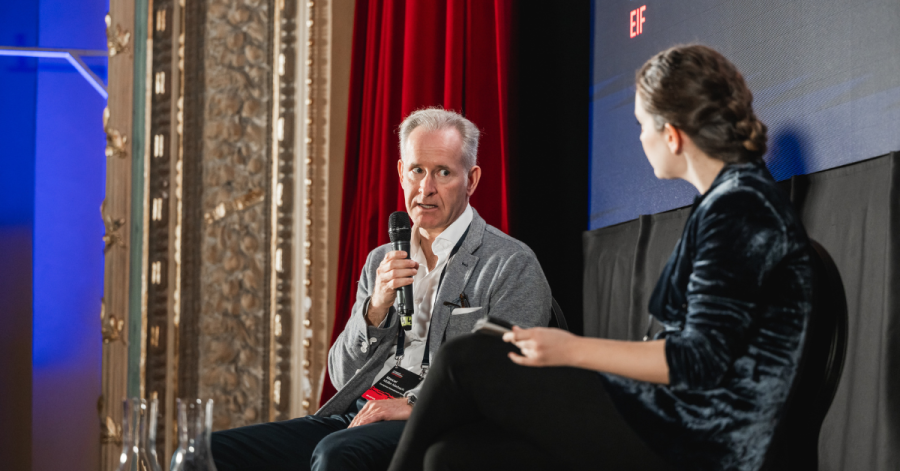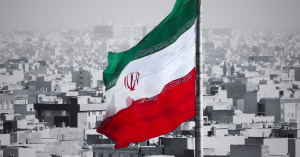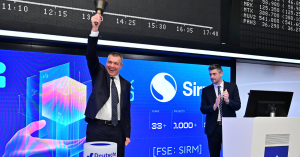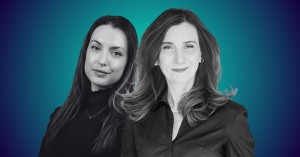The European Investment Fund (EIF), part of the European Investment Bank Group, has played a central role in developing Europe’s innovation and entrepreneurship landscape for more than two decades. Marcel Müller-Marbach, a senior figure at the EIF who has for many years headed the equity team in the institution’s Legal Service and who has just recently been appointed as its Senior Regional Representative for Austria, Slovakia and Czech Republic involved in negotiating fund terms and driving investment strategy, reflected on the institution’s evolution, mission, and future priorities during this year’s Engaged Investments conference in Prague.
A mandate rooted in European growth
The EIF was created in 1994 with a specific mission: to facilitate access to finance for Europe’s small and medium-sized enterprises (SMEs). While the EIB traditionally focused on long-term loans for large infrastructure, energy, transport, etc. projects, the EIF was deliberately designed to fill the gap in SME support.
“Our justification of existence is to support innovation and entrepreneurship in Europe,” said Marcel Müller-Marbach. As a fund-of-funds investor, the EIF allocates capital to venture capital, growth, infrastructure, private credit, and other alternative investment funds across Europe.
When Marcel Müller-Marbach joined the EIF in 2004, the organization’s equity activity was, compared to nowadays, modest. “In that year, we invested an aggregate amount of c. €350 million in about 15 funds. Last year, we invested in more than 100 funds, with commitments of around €7.2 billion in close to 200 equity transactions.”
This growth, he emphasized, is not simply about scale:
“We have not just grown for the purpose of growing – it reflects how much more important we have become for funds investing in European SMEs.”
Today’s European VC market is far more specialized than in the early 2000s, and the EIF has evolved accordingly. “We cannot rely on a fund’s marketing material alone. Instead, following an in-depth commercial and financial due diligence, we base our decisions on comprehensive investment documentation telling us exactly how capital will be allocated in terms of geography, stage, technology, and industry — and we monitor adherence rigorously.”
Public policy meets commercial discipline
As an EU institution, the EIF pursues Europe’s public-policy priorities. Investments must contribute to at least one of four policy goals:
1. Innovation and Digitalisation
2. Sustainability and Green Transition
3. Social Impact
4. Competitiveness and Growth
But policy alignment is not enough, as shared by Marcel. “We act as an institutional investor. Our shareholders expect us to generate a fair return. So every proposal must be both policy-relevant and financially sustainable.”
The EIF also enforces alignment of interest with fund managers:
“Alignment is key. Carried interest matters, but so does strict adherence to the agreed investment strategy we negotiate. If a fund doesn’t follow its promised strategy, we may look at contractual remedies, and we’re also unlikely to invest in the manager’s next fund.”
Misunderstandings about EIF funding
A recurring misconception in the market is that EIF funding is simply available upon application.
“It is fundamentally wrong to think you fill in a form and the money flows,” explained Marcel. “It is a competitive process. And if we are the only investor convinced, that’s not enough — in principle at least 50% of the fund must come from private investors.”
Another misunderstanding is that the EIF operates solely on public money. “The money does not fall from heaven. Whereas we manage large mandates from our shareholders, in particular the EIB and the European Commission, we also fundraise from financial institutions such as private pension funds, corporates and insurances.”
Strategic focus areas: Defense and Scale-up capital
Marcel Müller-Marbach highlighted two critical areas of future focus: security and defense, where he noted that “security and defense is pretty new for us, but I see this industry accelerating”; and scale-up funding, where Europe faces a persistent structural gap. Despite having strong early-stage ecosystems, Europe continues to lose companies during the growth phase, as “companies often cannot find the money they need to grow in Europe. Too often they leave for the US. We are working very hard on changing this,” he added.
To address this, the EIF launched the European Tech Champions Initiative (ETCI), a multi-billion-euro fund-of-funds vehicle backing large-scale growth funds capable of writing €100M+ checks.
“We are now building ETCI 2.0, aiming also to attract more private investors and create mechanisms that help European startups not only kick off — but remain European when they successfully scale.”
For Marcel Müller-Marbach, the most fulfilling part of his work is seeing real-world impact. “We are so close to the development of new technologies and innovations that shape everyone’s life. Many of the apps I use daily were built by companies supported by our funding. That is incredibly rewarding.”
He reflected on how this sense of mission developed over the years:
“When I started my career in the EIF, I was quite honestly focusing on having an income rather than finding a purpose. Today, I feel very much rewarded by being able to contribute to shaping tomorrow’s Europe.”








